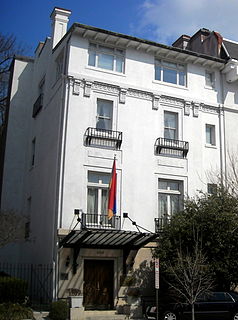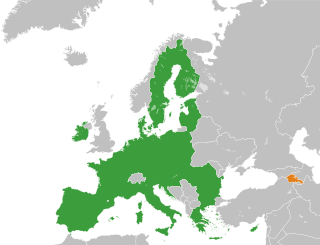Related Research Articles

The Armenian Genocide was the systematic mass murder and expulsion of 1.5 million ethnic Armenians carried out in Turkey and adjoining regions by the Ottoman government between 1914 and 1923. The starting date is conventionally held to be 24 April 1915, the day that Ottoman authorities rounded up, arrested, and deported from Constantinople to the region of Angora (Ankara), 235 to 270 Armenian intellectuals and community leaders, the majority of whom were eventually murdered.

Young Turks was a political reform movement in the early 20th century that favored the replacement of the Ottoman Empire's absolute monarchy with a constitutional government. They led a rebellion against the absolute rule of Sultan Abdul Hamid II in the 1908 Young Turk Revolution. With this revolution, the Young Turks helped to establish the Second Constitutional Era in 1908, ushering in an era of multi-party democracy for the first time in the country's history.

The Armenian Revolutionary Federation (ARF), also known as Dashnaktsutyun, is an Armenian nationalist and socialist political party founded in 1890 in Tiflis, Russian Empire by Christapor Mikaelian, Stepan Zorian, and Simon Zavarian. Today the party operates in Armenia, Artsakh and in countries where the Armenian diaspora is present. Nowadays it constitutes a minor party, and as of December 2018 was represented in two national parliaments with 7 seats in the National Assembly of Artsakh and three seats in the Parliament of Lebanon as part of the March 8 Alliance.

Eddie Bernice Johnson is an American politician from the state of Texas, currently representing Texas's 30th congressional district in the United States House of Representatives.

The post-Soviet states, also known as the former Soviet Union, the former Soviet Republics and in Russia as the near abroad, are the 15 sovereign states that emerged and re-emerged from the Union of Soviet Socialist Republics following its breakup in 1991, with Russia being the primary de facto internationally recognized successor state to the Soviet Union after the Cold War while Ukraine, by law, proclaimed that it is a state-successor of both the Ukrainian SSR and the Soviet Union which remained under dispute over formerly Soviet-owned properties. The three Baltic states were the first to declare their independence, between March and May 1990, claiming continuity from the original states that existed prior to their annexation by the Soviet Union in 1940. The remaining 12 republics all subsequently seceded. 12 of the 15 states, excluding the Baltic states, initially formed the CIS and most joined CSTO, while the Baltic states focused on European Union and NATO membership.

The Embassy of Armenia in Washington, D.C. is the diplomatic mission of Armenia located near Embassy Row in Washington, D.C. The embassy is located at 2225 R Street, NW in the Sheridan-Kalorama neighborhood.

The Young Turk Revolution of the Ottoman Empire was when the Young Turks movement restored the Ottoman constitution of 1876 and ushered in multi-party politics in a two stage electoral system under the Ottoman parliament. More than three decades earlier, in 1876, constitutional monarchy had been established under Sultan Abdul Hamid II during a period of time known as the First Constitutional Era, which only lasted for two years before Abdul Hamid suspended it and restored autocratic powers to himself. On 24 July 1908, Abdul Hamid capitulated and announced the restoration of Constitution, which established the Second Constitutional Era. After an attempted monarchist counterrevolution in favor of Abdul Hamid the following year, he was deposed and his brother Mehmed V ascended the throne.
Armenian Americans are citizens or residents of the United States who have total or partial Armenian ancestry. They form the second largest community of the Armenian diaspora after Armenians in Russia. The first major wave of Armenian immigration to the United States took place in the late nineteenth and early twentieth centuries. Thousands of Armenians settled in the United States following the Hamidian massacres of the mid-1890s, the Adana Massacre of 1909, and the Armenian Genocide of 1915 in the Ottoman Empire. Since the 1950s many Armenians from the Middle East migrated to America as a result of political instability in the region. It accelerated in the late 1980s and has continued after the dissolution of the Soviet Union in 1991 due to socio-economic and political reasons.

The Armenian National Committee of America (ANCA) is the largest and most influential Armenian American grassroots organization. Working in coordination with a network of offices, chapters and supporters throughout the United States and affiliated organizations around the world, the ANCA actively advances the concerns of the Armenian American community on a broad range of issues.

The Armenian Legion was a foreign legion unit within the French Army active during and just after World War I which fought against the Ottoman Empire. The original name of the legion was "La Légion d'Orient". It was renamed "La Légion Arménienne" on February 1, 1919. The soldiers in this legion were referred to informally among Armenians as Gamavor (Volunteer).
The Armenian Youth Federation (AYF) is the youth organization of the Armenian Revolutionary Federation. Founded in 1933, the AYF became a global Armenian organization and stands on five pillars that guide its activities: Educational, Hai Tahd, Social, Athletic and Cultural. Moreover, the AYF promotes social democratic values and a fraternal attitude of respect for ideas and individuals amongst its membership. Unity and cooperation are essential traits that allow members of the organization to work together to realize the AYF's objectives. The AYF is a full member of International Union of Socialist Youth and Young European Socialists.
The Armenian Assembly of America is the largest Washington-based nationwide organization promoting public understanding and awareness of Armenian issues. The organization aims to "strengthen U.S./Armenia and U.S. relations, promotes Armenia's democratic development and economic prosperity and seeks universal affirmation of the Armenian Genocide" via "research, education and advocacy."

The Near East Foundation (NEF), formerly the American Committee for Armenian and Syrian Relief, then the American Committee for Relief in the Near East, and later Near East Relief, is a Syracuse, New York-based American international social and economic development organization.

Armenia and the European Union have maintained positive relations over the years. Both parties are connected through the Comprehensive and Enhanced Partnership Agreement, which was signed in 2017. Armenian former Foreign Minister Eduard Nalbandyan expressed confidence that the new partnership agreement would "open a new page" in EU-Armenia relations. While, the former High Representative of the Union for Foreign Affairs and Security Policy, Federica Mogherini concluded in June 2019, that Armenia-EU relations are on an “excellent” level.

The following outline is provided as an overview of and topical guide to Armenia:

Jirair Sefilian is a Lebanese-born Armenian military commander and political activist. In 1992 he became the commander of the Shushi special military battalion, playing a significant role during the Battle of Shusha. In 1997-1998 Sefilian was the Artsakh Defense Army Brigade Commander. He is campaigning for regime change in Armenia and against any territorial concessions to Azerbaijan. Sefilian is the leader of the Founding Parliament opposition group. He is also the co-founder of the New Armenia Public Salvation Front.
The Armenian American lobby is the diverse coalition of those who, as individuals and as groups, seek to influence the United States foreign policy in support of Armenia, Armenians or Armenian policies. One of its primary goals is for the United States to recognize the Armenian Genocide, but the Turkish and occasionally Israeli lobby have until recently, successfully lobbied against this.
The Azerbaijani diaspora are the communities of Azerbaijanis living outside the places of their ethnic origin: Azerbaijan and the Iranian region of Azerbaijan. The term Azerbaijani diaspora refers to the global community of ethnic Azerbaijanis.

The Anti-Defamation League (ADL), formerly known as the Anti-Defamation League of B'nai B'rith, is an international Jewish non-governmental organization based in the United States. It was founded in late September 1913 by the Independent Order of B'nai B'rith, a Jewish service organization. ADL subsequently split from B'nai B'rith and continued as an independent U.S. Section 501(c)(3) nonprofit. In its 2017 annual information Form 990, ADL reported total revenues of just over $70 million, from contributions and grants. ADL states that its mission is a dual one: "To stop the defamation of the Jewish people, and to secure justice and fair treatment to all" via the development of "new programs, policies and skills to expose and combat whatever holds us back." Opposing antisemitism and extremism, ADL describes its "ultimate goal" as "a world in which no group or individual suffers from bias, discrimination or hate."

The nomination of Robert M. La Follette for president took place at a convention held in Cleveland, Ohio from July 4-5, 1924. The convention was called by the Conference for Progressive Political Action (CPPA) and included accredited delegates from national trade unions, state branches of the CPPA, and other political organizations. Members of the Socialist Party of America played a prominent role in the organization of the July convention and the subsequent La Follette presidential campaign; representatives of the Communist Workers Party of America were banned.
References
| This article related to the politics of the United States is a stub. You can help Wikipedia by expanding it. |
| This article about an organization in the United States is a stub. You can help Wikipedia by expanding it. |